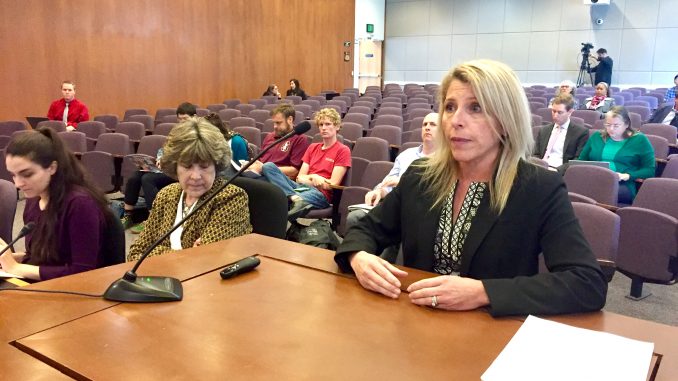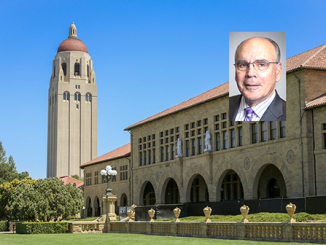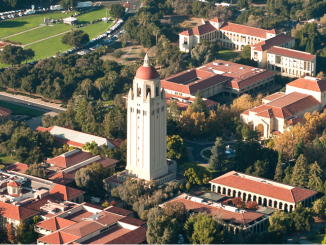
BY ALLISON LEVITSKY
Daily Post Staff Writer
Stanford leaders Thursday (May 9) urged Santa Clara County officials to suspend the hearing process for their 3.5 million-square-foot proposed expansion until the two entities can agree on Stanford’s obligations around housing, traffic and other issues.
Stanford’s Associate Vice President Catherine Palter delivered a letter to county officials yesterday asking that rather than proceeding with a public hearing before the county Planning Commission on May 30, that they revise their conditions of approval on the project to make them “feasible” for Stanford while at the same time reopen negotiations for a development agreement.
To get its development approved by the county, Stanford has to abide by a set of conditions of approval approved by the county Board of Supervisors. In March, the county released a summary of proposed conditions of approval, including the requirement that the expansion be approved in 25% increments every five years or more.
A parallel process, a development agreement, commenced in October. Two county supervisors met with Stanford officials behind closed doors to negotiate a deal for extra community benefits, such as funding for the Palo Alto school district.
But the county suspended the development agreement negotiations with Stanford last month after Stanford violated the terms of the negotiations by making a $138 million side deal with the school district.
County Board of Supervisors President Joe Simitian said that agreement amounted to Stanford holding a gun to the head of the Board of Supervisors because the school funding would have been contingent on the approval of Stanford’s expansion.
Stanford wants to avoid ‘uncertainty’
In yesterday’s letter, Palter states that the summarized conditions of approval that the county released in March “would create tremendous uncertainty” by requiring phased-in approvals and future studies.
That, Palter says, makes it difficult for Stanford to “front-load” benefits such as providing affordable housing up front, ahead of job growth.
“It is not viable for an applicant to fund costly upfront community benefits knowing that it might not be allowed to complete its project over the long term,” Palter writes.
Palter also writes that the 2,172 housing units and 2,600 student beds required by the conditions of approval would create significant environmental impacts, such as 1,400 additional car trips per day during peak hours, four times as many K-12 schoolchildren and another 2 million square feet of building construction and associated construction impacts.
From Stanford’s point of view, the county’s proposed vision “calls for transforming a college campus into an urban apartment complex.”
In addition, Palter writes that the county’s traffic limitations would constrain the community’s use of the Stanford campus for events.
Reaction to Stanford’s letter
At a study session in San Jose yesterday, Planning Commission Vice Chair Marc Rauser said the letter from Stanford seemed to be saying that university officials thought the county was being unfair.
“I wouldn’t say that we’re thinking it’s unfair. It is just uncharacteristic of how most jurisdictions would process a development application,” said Jessica von Borck, Stanford’s director of land-use planning.
Von Borck said it was “critical” that the Planning Commission evaluate Stanford’s proposal with a development agreement and conditions of approval that Stanford saw as feasible.
Jacqueline Onciano, the county’s director of planning and development, said that the county sees the development agreement as “voluntary” and not required for the purposes of the Planning Commission to make a recommendation on the Stanford expansion.
“We also feel like it’s not necessary to delay the hearing that is scheduled for the 30th of May for the commission. It’s certainly your discretion,” Onciano said, turning to the Planning Commission.
San Mateo County’s community development director, Steve Monowitz, sided with Onciano.
“I don’t find the process outlined by staff unusual. What I find unusual is Stanford’s expectation to receive an entitlement for 3.5 million square feet of development over a 20-year period with no opportunities for really meaningful check-in,” Monowitz said. “There comes a point where Santa Clara County needs to act independently and consider the concerns of all the stakeholders, not just Stanford.”
Menlo Park councilwomen Cecilia Taylor and Betsy Nash agreed, urging the county to proceed with the public hearing process as scheduled.
The May 30 Planning Commission is scheduled for 6 p.m. at Palo Alto City Hall.
Did you know that only some of the local news stories the Daily Post covers appear on this website? To get all the local news, including many stories you can’t find online, pick up the Post every morning at 1,000 Mid-Peninsula locations.




Looks like Stanford is having a temper tantrum because it’s not being allowed to make the rules. Bo hoo! Maybe they’ll file a couple more lawsuits to pressure the county!
Stanford is upset because they can’t get their way. If they want to withdraw the application, that’s fine with me.
They sent actual nobility to ask for a public accommodation for a private school… At what point did that seem like a good idea.
… a noble woman walks into a bar and tells the barkeep her bed is too hard and she isn’t being treated fairly…